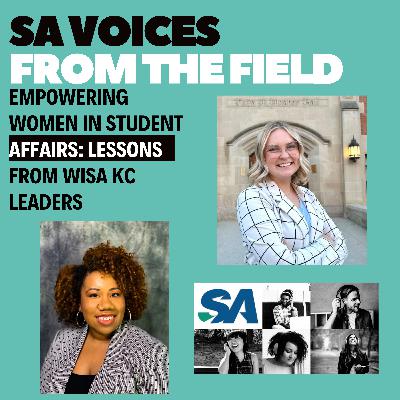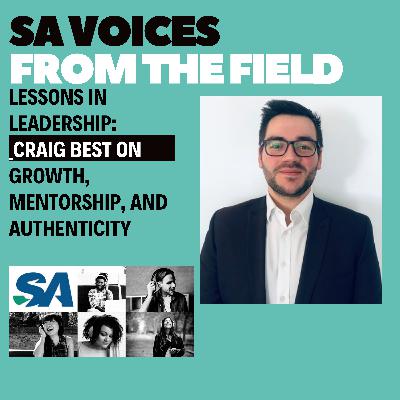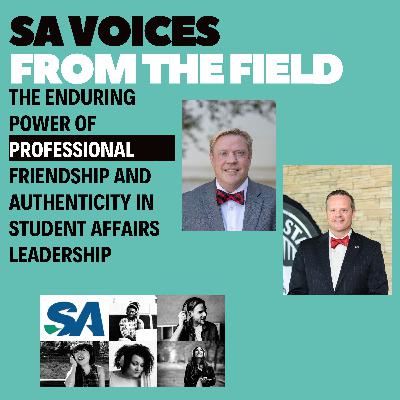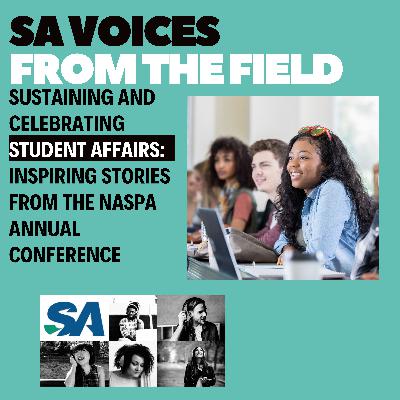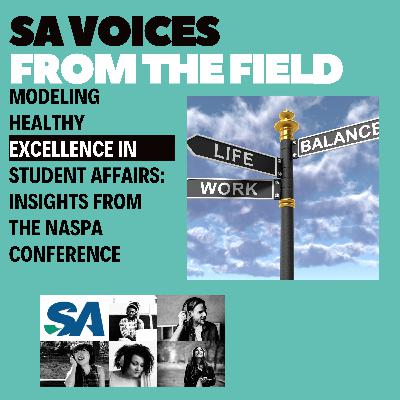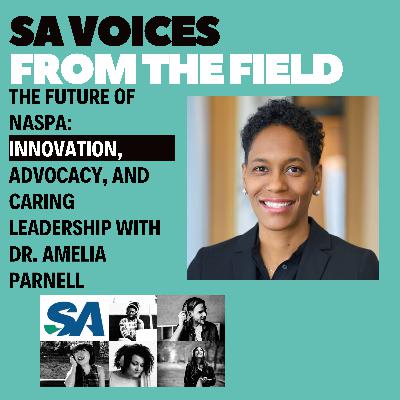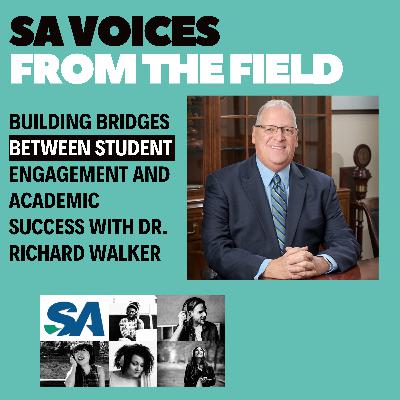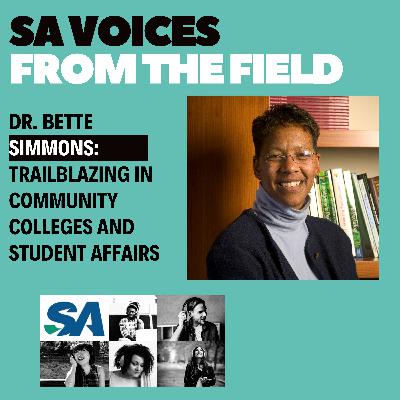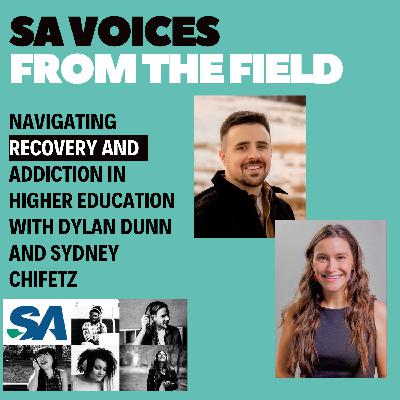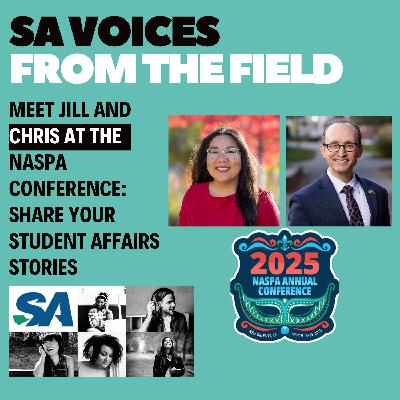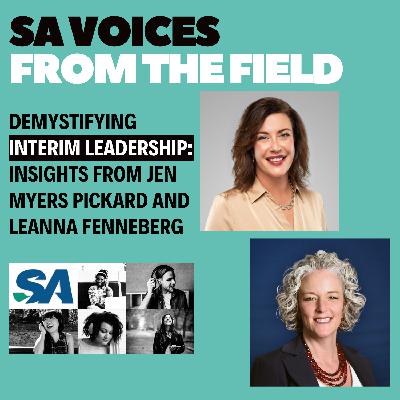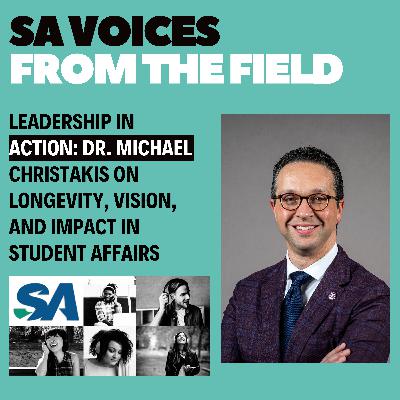Embracing AI and Technology in Student Affairs: Insights from NASPA Conference Voices
Description
In the latest episode of "Student Affairs Voices from the Field," listeners are treated to an energetic collection of perspectives straight from the annual NASPA conference. This dynamic, "person on the street" episode—hosted by Dr. Jill Creighton—dives into a pressing topic: How can we better leverage technology to meet the evolving needs of students in higher education?
What stands out most from these conversations is the profession’s willingness to lean into change, rather than shy away from it. From associate vice presidents to graduate students, professionals across the nation acknowledge that technology—and especially artificial intelligence (AI)—is reshaping student affairs. As Dr. Eddie Martinez puts it, “The bus has left the station … we need to play catch up.” There’s consensus: AI isn’t just a trend. It’s a powerful tool that can streamline administrative tasks, enhance communication, and free up time for the real heart of student affairs—the human connection.
But it’s not all enthusiasm and optimism. Many professionals, like Eileen Hentz and Dr. Bernard Little, admit to their initial hesitation and the need for continual learning. The episode encourages honesty about where we’re starting from, and models what it means to be a lifelong learner in higher ed. Just as importantly, ethical use, intentionality, and a focus on access are recognized as essential values as we navigate these new tools.
Students themselves are often ahead of the curve, pushing their institutions to integrate technology in ways that feel intuitive and relevant. Yet, as several speakers caution, “simple is better.” Too many platforms can overwhelm students, so thoughtful integration—rather than chasing every shiny new thing—is crucial. Streamlining platforms, as Dr. Will Simpkins urges, helps ensure technology truly empowers rather than confuses our campus communities.
This episode is a masterclass in collective wisdom: you’ll hear voices championing data-driven decisions, advocating for AI workshops, and urging a balance between technological innovation and the irreplaceable human touch. The themes are clear—embrace change, keep learning, focus on ethical and efficient solutions, and never lose sight of the student experience.
Tune in to hear these fresh perspectives and discover actionable insights that you can bring back to your own work. Whether you’re tech-savvy or just starting your journey, you’ll leave inspired to reimagine how technology can support both you and your students. Listen now and join the conversation!
TRANSCRIPT
Dr. Jill Creighton [00:00:01 ]:
Welcome to Student Affairs Voices from the Field, the podcast where we share your student affairs stories from fresh perspectives to seasoned experts. Brought to you by NASPA, we curate free and accessible professional development for higher ed professionals wherever you happen to be. This is season 12, continuing our journey through the past, present, and future of student affairs. I'm doctor Jill Creighton, she, her, hers, your essay Voices from the Field host. Welcome back to Student Affairs Voices from the Field. We're here with our three conference episodes that feature your voices. Chris and I were able to move about the conference and connected with over 60 of you who shared your thoughts on the three conference themes. We asked you each one question on each theme, and we're going to be bringing you one episode per question.
Dr. Jill Creighton [00:00:46 ]:
So today's question will be on theme one, which was well-being and healthy excellence in student affairs. Next week, we'll be bringing you theme two in changing the student affairs profession, and then finally, theme three, which is sustaining and celebrating the student affairs profession. Today's question was, how can student affairs professionals model healthy excellence in their own lives and institutional cultures while supporting students' well-being? If you joined us, thank you so much for sharing your voice, and we hope that you enjoy hearing from your colleagues and peers.
Eileen Hentz [00:01:15 ]:
Hello. My name is Eileen Hence. I am the program director of academic and student services at the University of Maryland Department of Aerospace Engineering. Do as I say, not as I do, because I am not I will admit that I am not the best at modeling healthy excellence in my own life, but I really truly believe it's important to do so by having a healthy work life balance and making sure you remember your priorities and trying your best to ensure that you don't lose yourself in your work. I think that's something that I need to do more of, is remembering that I do have an important life outside of work, and it is okay to say no, and it is okay to set boundaries on our time, and still pour as much of our heart and soul into our jobs as possible during the times we should be working and when we should not be working to make sure that we take that time for ourselves and not feel guilty about it.
Dr. Alyssa Bivens [00:02:07 ]:
Hi. I'm doctor Alyssa Bivens. I'm representing George Mason University. I'm in their very new graduate division as a graduate career and professional development program coordinator. I think one of the ways that student affairs professionals that we can model healthy excellence in our own lives and institutional cultures is really trying to be the people that we want our students to be. So for example, I work with a lot of graduate professional assistants, and I try to model professional behaviors both with them, treating them how I wanna be treated, and also showing them good work and professionalization skills from organization to just general things that will help them moving forward in life so that they have a model that they can potentially look towards. I try to be, not always.
Anurant Ranieri [00:02:53 ]:
I'm Anurant Ranieri. I'm from Texas A and M University in College Station, Texas. I am currently serve as the associate director of career services for Mays Business School. I think showcasing balance of, like, walking the walk and talking the talk. Right? Like, that's really an important aspect of student affairs that sometimes we don't do. We we tell students to take care of themselves, but we're not always taking care of our own selves. And so making sure that we take the advice that we give students most of the time. I know I'm really bad about that, but I sometimes will be, like, check myself and be, like, oh, right.
Anurant Ranieri [00:03:26 ]:
What I would tell a student in this moment, I need to tell myself I need
Mimi Benjamin [00:03:29 ]:
to get more sleep or I need to do this thing.
Anurant Ranieri [00:03:30 ]:
And so I think that's really important.
Amy Law [00:03:34 ]:
Hello. My name is Amy Law. I am a GAP from the graduate associate program with NASPA. I am from California. I currently attend the University of Southern California for my degree in post secondary administration and student affairs with my master's program. Especially as student affairs professionals, I feel like we can really model healthy excellence in our own lives and even contribute to that institutional culture by being student facing even as we go into higher levels that are not so student facing. I think maintaining a level of student support and student advisory, like, committees even and leveraging, like, student voices is definitely a perfect way to model healthy excellence because students know best what they need and students know best how to advocate for themselves. And if you are not, you know, in a point where you're at least, like, reaching out or asking them how they need the support, I feel like it's a little bit hard to understand them in that way.
Amy Law [00:04:38 ]:
So always making sure that you have another set of eyes, whether it's from a group of students or even just one student, will make such a big difference.
Angela Watts [00:04:50 ]:
Angela Watts, the University of Texas Health Science Center in San Antonio School Of Nursing. I'm the director for student success. I think that student affairs professionals can model healthy excellence in their own lives by really small ways in our day to day lives. Simple things like not eating lunch at your desk, taking that time away to rejuvenate during that hour and and really just modeling the behavior that we encourage in our students. When you take time off from work, actually disconnecting as much as possible and just really demonstrating for them how to have as much balance as possible even though we all know that it's impossible to be completely balanced with work life, but just demonstrating as much as possible the healthy behaviors that we encourage in our students.
Asia Jones [00:05:39 ]:
Asia Jones, associate director at the National Association for Student Affairs Professionals, AKA NASBA. So I believe one of the ways that we model healthy excellence is resting. Rest is resistance. So many years in student affairs, we've thought we've had to work sixteen and seventeen hour days to get things done. And the way we model in our own lives that healthy excellence is knowing when to take breaks, knowing when to rest, and setting boundaries around that to be able to still get the work done. But if we don't have any rest or any sleep, then we're doing things on a not even a half empty cup, like, maybe three fourths of a cup, and that's not working anymore. And so we've gotta find different ways to to set up boundaries so that within ourselves so that we can be the best to other people.
Dr. Bernard Little [00:06:27 ]:
I'm doctor Bernard Little, vice president for student affairs at Prairie State College. I think that one way that we can model healthy excellence in our ow


